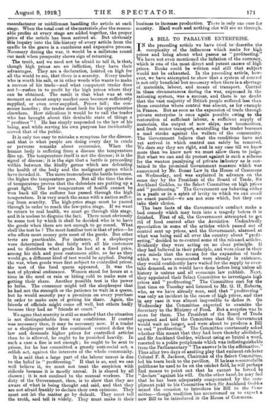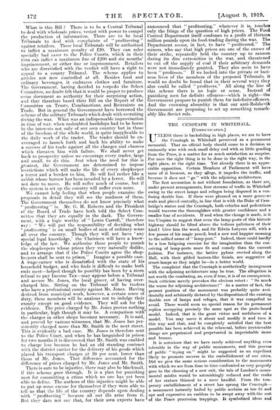A BILL TO PARALYSE ENTERPRISE.
IN the preceding article we have tried to • describe the complexity of the influences which make for high prices and bring about what passes as "profiteering." We have net even mentioned the inflation of the currency, which is one of the most direct and potent causes of high prices. Books could be written and still that subject would not be exhausted. In the preceding article, however, we have attempted to show that a system of control is not only beneficial but necessary when there is a shortage of materials, labour, and means of transport. Control in these circumstances during the war, expressed in the rationing system, was a success, and there is no doubt that the vast majority of British people suffered less than those countries where control was absent, as for example in France. But as soon as the expansion of trade through private enterprise is once again possible owing to the restoration of sufficient labour, a sufficient supply of materials, the output of new ships, new locomotives, and fresh motor transport, controlling the trader becomes a mad stroke against the welfare of the community. The Government believe that the conditions have not yet arrived in which oontrol can safely be removed. We dare say they are right, and in any case till we know more than we know now we must allow them to judge.
But what we can and do protest against is such a scheme for the wanton paralysing of private industry as is con tained in the promised Government measure which was announced by Mr. Boner Law in the House of Commons on Wednesday, and was explained in advance on the same day by the President of the Board of Trade, Sir Auckland Geddes, to the Select Committee on high prices and "profiteering." The Government are behaving either in a panic or in a spirit of levity to which we can iecall no exact parallel—we are not sure which, but they can take their choice.
The bare facts of the Government's conduct make a bad comedy which may turn into a tragedy before it is finished. First of all, the Government attempted to get rid of food control after the Armistice. Undoubtedly speculation in some of the articles which passed out of control sent up prices, and the Government, alarmed at what was being said all over the country about "profiteering," decided to re-control some of the released articles. Evidently they were actinfs on no clear principle. If they had believed in their principle, and were clear in their own minds that the means for the expansion of trade which we have enumerated were already in existence, they would confidently have waited for the supply to overtake demand, as it would have done before long unless all history is untrue and all economie law rubbish. Next, they appointed their Select Committee to investigate high prices and "profiteering." The Committee met for the firet time on Tuesday and listened to Mr. G. H. Roberts, who, as we have already seen, said that " profiteering " was only an incident in the cause of high prices, and that in any case it was almost impossible to define it. On Wednesday the Committee expected to examine the Secretary to the Ministry of Food. But a surprise was in store for them. The President of the Board of Trade appeared and told the Committee that the Government would wait no longer and were -about to produce a Bill to end "profiteering.' The Committee courteously asked whether this meant that they had been thereby abollehed, and Sir Auckland Geddes, without wing so brutal a word, resorted to a polite periphrasis which was indistinguishable from the Parliamentary" The answer is in the affirmative." Thus after two days of exciting play that eminent cricketer Colonel F. S. Jackson, Chairman of the Select Committee, led his team back to the pavilion. If liaises resourceful in politicsas he used to be on the cricket field, he will perhaps find means to point out that he cannot be forced " declare " against his will. On the other hand, he may fee that he has been adequately compensated by the compliment paid to his Committee when Sir Auckland Geddes seized the occasion to introduce his Bill to the Committee—though tradition has accustomed us to expect a new Bill to be introduced in the House of Commons. What is this Bill ? There is to be a Central Tribunal to deal with wholesale prices, vested with power to compel the production of information. There are to be local Tribunals to deal with complaints of " profiteering " against retailers. These local Tribunals will be authorized to inflict a maximum penalty of £20. They can refer specially had cases to the Police Courts, which in their torn can inflict a maximum fine of £200 and six months' imprisonment, or either fine or imprisonment. Retailers who are dissatisfied with the verdict will have a right to appeal to a county Tribunal. The scheme applies to articles not now controlled at all. Besides food and ordinary beverages, it embraces clothes and furniture. The Government, having decided to torpedo the Select Committee, no doubt felt that it would be proper to produce some document as authority for their surprising action, and they therefore based their Bill on the Report of the Committee on Trusts, Combinations, and Restraints on Trade. But in general the Government have borrowed the scheme of the military Tribunals which dealt with recruiting during the war. What was an indispensable improvisation in time of war, when undoubted hardships had to be borne in the interests not only of our own country but in those of the freedom of the whdle world, is quite inapplicable to the daily work of the trader. The trader should be encouraged to launch forth and back his ability to make a success of his trade against all the changes and chances which threaten him with failure. We shall never get back to prosperity unless we encourage every trader, large and small, to do this. Just when the need for this is greatest, the Government are determined to impose restrictions which will make the life of every shopkeeper a terror and a burden to him. He will feel rather like a rabbit whose burrow has been invaded by a ferret. He will not dare to move. He will suffer much of course, but if the system is set up the country will suffer even more.
We cannot help feeling that when people examine the proposals in detail they will see the madness of them. The Government themselves do not know precisely what profiteering" is. Mr. G. H. Roberts and the President of the Board of Trade have both told the Select Committee that they are equally in the dark. The Government, with a logic worthy of " Lewis Carroll," therefore say : "We will put the responsibility of deciding what ' profiteering ' is on small bodies of men of ordinary sense all over the country. Though they will not have any special legal knowledge,' the Chairmen will have a knowledge of the law. We authorize these people to punish the shopkeepers whose prices they very naturally dislike, and to arrange that if the Police Courts agree the shopkeepers shall be sent to prison." Imagine a possible case. A wage-earner who is dissatisfied with the state of his household budget, and who finds it difficult to make both ends meet—helped though he possibly has been by a stern refusal to pay Income Tax—may appear before a Tribunal and accuse Mr. Jones, the local grocer, of having overcharged him. Sitting on the Tribunal will be traders who have a professional enmity against Mr. Jones. Having derived from municipal work, however, a certain sense of duty, these members will be anxious not to indulge their enmity except on good evidence. They will ask for the evidence. The price charged by Mr. Jones proves nothing in particular, high though it may be. A comparison with' the charges in other shops becomes necessary. It is said, and proved by various witnesses, that Mr. Jones has persistently charged more than Mr. Smith in the next street. This is evidently a bad case. Mr. Jones is therefore sent to the Police Court, and when he has languished in prison for two months it is discovered that Mr. Smith was enabled to charge less because he had an old standing contract with the district carrier for the delivery of his goods which placed his transport charges at 20 per cent, lower than those of Mr. Jones. That difference accounted for the difference of prices charged by Mr. Jones and Mr. Smith.
There is sure to be injustice, there may also be blackmail, if this scheme goes through. It is a plan for punishing men for committing a crime which no one has yet been able to define. The authors of this injustice might be able to put up some excuse for themselves if they were able to tell us that the life of the country depends upon dealing with " profiteering " because all our ills arise from it. But they dare •not say that, for their own experts have announced that "profiteering," whatever it is, touches only the fringe of the question of high prices. The Food Control Department itself confesses to a profit of thirteen million pounds upon its food-trading during the war. The Department seems, in fact, to have "profiteered." The miners, who say that high prices are one of the causes of their strike, repeatedly held the country up to ransom during its dire extremities in the war, and threatened to cut off the supply of coal if their arbitrary demands were not immediately granted. They also seem to have been "profiteers." If we looked into the private or business lives of the members of the proposed Tribunals, it would no doubt be found that in their several ways they also could be called "profiteers." All along the line of this scheme there is no logic or sense. Instead of punishing men for definite offences—which is right—the Government propose to punish them for indefinite offences. And the crowning absurdity is that our anti-Bolshevik Government are proposing to set up something remarkably like Soviet rule.



































 Previous page
Previous page